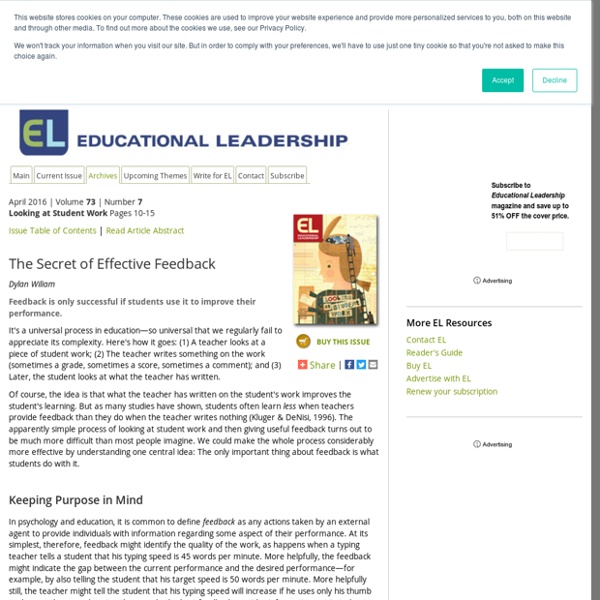



Archimedean leadership (2): What are leverage observations? Or, how would Yo-Yo Ma feed back? When he travels to perform, Yo-Yo Ma also teaches. Introducing leverage observations, Paul Bambrick-Santoyo showed this example of Ma’s feedback: My introductory post raised seven problems prevalent in observations: infrequency and judgment; overwhelming feedback or lack of guidance; insufficient support implementing and sustaining change and superficial solutions. Conversely, feedback from Ma is in-the-moment, specifies how to change and brings about immediate improvement. Leverage coaching aims to create something more like a Yo-Yo Ma masterclass than a conventional observation.* Having introduced them at GFS this term, this post explains, step-by-step, how they work (from an observer’s perspective); future posts evaluate their effectiveness. 1) Schedule feedback meetings (surprisingly important)
What can we learn from Dylan Wiliam and AfL? ‘The only thing we learn from the past is how little we’ve learned from our mistakes’. Geog Wilhem Friedrich Hegel ‘Those who cannot remember the past are condemned to repeat it’ George Santayana ‘Blessed are the forgetful: for they get the better even of their blunders’. EEF marking review I’ve rushed out this blog to try and take control of the narrative because in my view there are two damaging statements from the executive summary that are backed with no evidence and school leader may seize upon them. So forgive any grammar/punctuation mistakes(!) They are:
Decoupling summative and formative assessment The following post is my seminar notes from a session I ran with Christine Counsell on why ‘summative’ and ‘formative’ assessment need to be decoupled, particularly in terms of not principally using summative marking criteria to inform teaching. I am particularly grateful to the history teaching community (particularly the so-called ‘History Pizza Assessment Group’ in Cambridge) and Daisy Christodoulou for helping me clear up my thinking on this matter. The current prevailing model in formative assessment is to give pupils a task (an essay, an exam question, a piece of music to play) and then to judge their competence at that task using a series of levels, often based on either task-specific or generic descriptions of competence. Having ascertained how well a pupil performed on that task, we then identify what was absent from the performance: what should have been done that was not, or what could have been done better?
A marked decline? The EEF’s review of the evidence on written marking …the review found a striking disparity between the enormous amount of effort invested in marking books, and the very small number of robust studies that have been completed to date. While the evidence contains useful findings, it is simply not possible to provide definitive answers to all the questions teachers are rightly asking. [my emphasis] But then they go and spoil it all by saying something stupid like: Some findings do, however, emerge from the evidence that could aid school leaders and teachers aiming to create an effective, sustainable and time-efficient marking policy. These include that:Careless mistakes should be marked differently to errors resulting from misunderstanding.
Getting Better at Feedback – In search of joy and knowledge Getting Better at Feedback The last few weeks have seen us progress through each of our Cornerstones of Teaching & Learning at The Sheffield College with drop-ins from the Digital and e-Learning team, links to browse via our Twitter feed and a blog each week for staff to reflect on – So in the fourth and final week, our attention turns to feedback. Gallery Critique The 15 minute forum was led tonight by English teacher Jo Grimwood. Jo started the session by sharing with us the concerns she has with peer assessment: Students don’t know how to assess work – we are the professionals, they aren’t!They’re sensitive about their friends reading their work.They’re not sure how to mark/what to say.They’re not clear on what’s good/what’s not.They give vague/unhelpful feedback, because they don’t know where/how the feedback should be focused.It doesn’t help them to understand the important areas of weakness and how to move on. So as a process, it’s not always that useful. In fact, it can often be damaging and compound misconceptions.
Getting Better at Feedback The last few weeks have seen us progress through each of our Cornerstones of Teaching & Learning at The Sheffield College with drop-ins from the Digital and e-Learning team, links to browse via our Twitter feed and a blog each week for staff to reflect on – So in the fourth and final week, our attention turns to feedback. As I spent some time reviewing and gathering links related to feedback, I realised that if I let it, it could easily fill my entire week. This page contains the best of the links I came across-